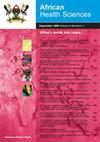尼日利亚绝经后妇女腹部肥胖、血清雌二醇和心血管风险:一项横断面研究
IF 0.9
4区 医学
Q3 MEDICINE, GENERAL & INTERNAL
引用次数: 0
摘要
背景:男性心血管(CV)疾病死亡率通常较高,但绝经后的女性死亡率与男性相同。 目的:确定腹部肥胖和雌二醇对绝经后妇女(PMW)心血管风险的影响,并评估其心血管风险概况。 方法:以医院为基础的横断面研究连续招募了271名自愿的PMW患者。获得了他们的社会人口学、血压和人体测量数据,并进行了血脂和血清雌二醇的实验室分析。使用标准化计算器估计参与者的心血管风险。 结果:参与者平均年龄57.8±5.5岁。甘油三酯(阳性)、高密度脂蛋白(阴性)与腰臀比(WHR)存在显著相关(p分别为0.001和0.000)。高血压和血脂异常与WHR显著相关(p分别为0.01和0.031)。CV风险谱与血清雌二醇呈显著负相关(rs = -0.140, p = 0.028)。WHR增加10个单位与2倍的高血压风险相关(OR>1.73, c.i. = 1.13-2.66)。年龄单位变化与TC增加0.61相关。 结论:腹部肥胖和血清雌二醇显著影响心脏代谢风险。因此,推荐使用新的风险计算器,其中包括血清E2等女性特有的因素。关键词:心血管危险;绝经后妇女;腹部肥胖。本文章由计算机程序翻译,如有差异,请以英文原文为准。
Abdominal obesity, serum estradiol and cardiovascular risk among Nigerian postmenopausal women: a cross-sectional study
Background: Rates of cardiovascular (CV) disease mortality is usually higher in men but this equalizes with that of women following menopause.
Objectives: This was to determine the contribution of abdominal obesity and estradiol to cardiovascular risk in postmenopausal women (PMW) as well as estimate their CV risk profile.
Methods: 271 consenting PMW were recruited consecutively into this cross-sectional hospital-based study. Data relating to their socio-demography, blood pressure and anthropometry was obtained and laboratory analysis of lipid profile and serum estradiol was done. Cardiovascular risk of participants was estimated using standardized calculators.
Results: Mean age of participants was 57.8±5.5 years. Significant correlation existed between each of triglyceride (Positive), High Density Lipoprotein (negative) and Waist-Hip-Ratio (WHR) (p=0.001 and 0.000 respectively). Hypertension and dyslipidaemia were significantly associated with WHR (p=0.01 and 0.031 respectively). Significant negative correlation existed between CV risk profile and serum estradiol (rs = -0.140, p = 0.028). Ten-unit increase in WHR was associated with two-fold risk of hypertension (OR> 1.73, C.I.= 1.13-2.66). A unit change in age was associated with 0.61 increase in TC.
Conclusion: Abdominal obesity and serum estradiol significantly influence cardio-metabolic risk. Newer risk calculator which incorporates factors peculiar to women such as serum E2 is hereby recommended.
Keywords: Cardiovascular risk; postmenopausal women; abdominal obesity.
求助全文
通过发布文献求助,成功后即可免费获取论文全文。
去求助
来源期刊

African Health Sciences
MEDICINE, GENERAL & INTERNAL-
CiteScore
2.30
自引率
0.00%
发文量
179
审稿时长
>12 weeks
期刊介绍:
The African Health Sciences is an internationally refereed journal publishing original articles on research, clinical practice, public health, policy, planning, implementation and evaluation, in the health and related sciences relevant to Africa and the tropics. Its objectives are to: Advocate for and promote the growth of reading culture in sub Saharan Africa; Provide a high quality journal in which health and policy and other researchers and practitioners in the region can and world wide, can publish their work; Promote relevant health system research and publication in the region including alternative means of health care financing, the burden of and solution of health problems in marginalized urban and rural communities amongst the displaced and others affected by conflict; Promote research and the systematic collection and collation and publication of data on diseases and conditions of equity and influence; Promote development of evidence-based policies and guidelines for clinical, public health and other practitioners. African Health Sciences acknowledges support provided by the African Health Journals Partnership Project that is funded by the US National Institutes of Health (through the National Library of Medicine and the Fogarty International Center) and facilitated by the Council of Science Editors.
 求助内容:
求助内容: 应助结果提醒方式:
应助结果提醒方式:


